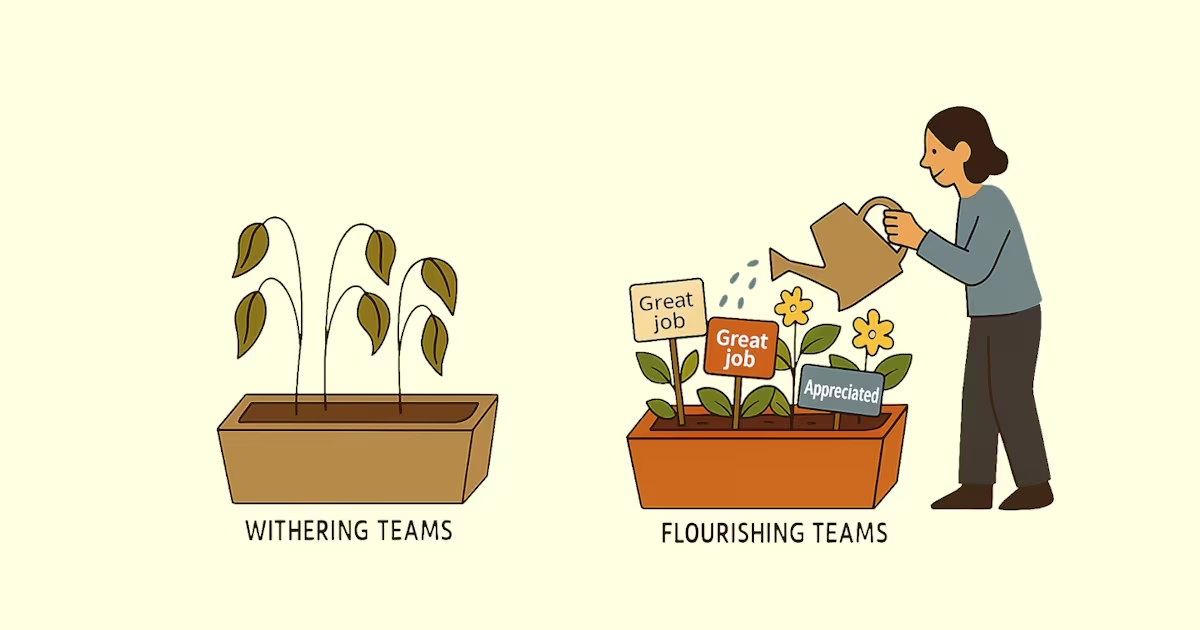
Signs of a Recognition-Starved Team (and How to Turn It Around)
You Might Be Doing Everything Right… and Still Losing Morale
Your team might be delivering on time, stand-ups might run smoothly and workflows might be humming along. On the surface, everything looks fine. But something feels off. The energy is flat, retros feel heavy and people seem emotionally distant. If this sounds familiar, your team might not be broken, it might just be recognition-starved.
What Is a Recognition-Starved Team?
A recognition-starved team isn’t about perks, bonuses, or performance reviews. It’s not about free pizza or annual awards. It’s about something much deeper: feeling seen. When recognition is missing, people begin to feel invisible. Their effort blends into the background, progress is ignored and connection between teammates weakens. Recognition isn’t happening naturally, regularly, or meaningfully and over time, that leaves teams drained.
How to Spot the Symptoms
Recognition gaps often show up in subtle ways. Maybe your meetings feel flat. Stand-ups sound more like status reports than moments of collaboration. In retrospectives, the focus is always on problems while progress gets skipped over. Perhaps all recognition, when it happens at all, comes from managers rather than peers. Team members stop taking ownership and fall back on phrases like, "I just did what I was told." The result is delivery without motivation, output without joy. These are the warning signs of a recognition-starved culture.
Why Teams Slip Into This State
Often, it’s not intentional. Everyone is busy and recognition simply falls off the radar. Agile rituals default to fixing problems instead of reinforcing what works. Sometimes, teams believe recognition has to be big or formal, a speech, an award, or a company-wide announcement. But in reality, it’s the everyday words of appreciation that matter most. In hybrid and remote teams, the problem is even sharper, since casual "thank yous" don’t happen in passing conversations.
If your team struggles to express appreciation consistently, using a simple structure like kudo cards can make recognition easier, more natural and more frequent—without feeling forced or formal.
Why Recognition Matters More Than You Think
Recognition isn’t just nice, it’s necessary. Research shows that 81.9% of employees say recognition improves motivation. People who feel appreciated are 2.7 times more likely to be engaged at work. And it’s not only about productivity. Recognition fuels psychological safety, which Harvard professor Amy Edmondson identifies as the foundation of trust and learning in teams. There’s neuroscience behind this too. Genuine appreciation triggers dopamine and serotonin, boosting mood and reinforcing behaviors you want to see more of (Upskillist). Without it, teams can feel stuck in a negative loop, unable to notice progress or celebrate achievements.
How to Turn Things Around
The good news is that recognition doesn’t need to be complicated. Small changes make a big difference. Start with micro-recognition. Instead of a generic "Nice work." be specific: "Thanks for the way you summarized that meeting in Slack, it made next steps so much clearer." Appreciation is most powerful when it names the behavior and explains the impact.
Encourage kudos to flow peer-to-peer, not just from managers. Recognition feels authentic when it comes from teammates who see each other’s contributions up close. Tools like esteam.life can make this frictionless and part of the daily workflow. If your team prefers a simple, structured way to express appreciation, consider introducing kudo cards as a lightweight recognition habit.
Weave appreciation into existing Agile rituals. Begin retros with a round of "what went well" or add a kudos moment to stand-ups. Celebrate not just completed work, but improvements and collaboration along the way. Finally, make recognition visible. Track and reflect on the kudos your team gives each other. Over time, you’ll start to see patterns that highlight the culture you’re building.
Final Thought: Teams Don’t Just Need Direction, They Need to Feel Seen
When people feel recognized, they bring energy, ownership and care to their work. When they don’t, even high-performing teams can slowly lose their spark. If your team feels flat, look beyond process. Look at recognition. Start small, make it specific and make it consistent. The wins are already there, you just need to help your team see them again.